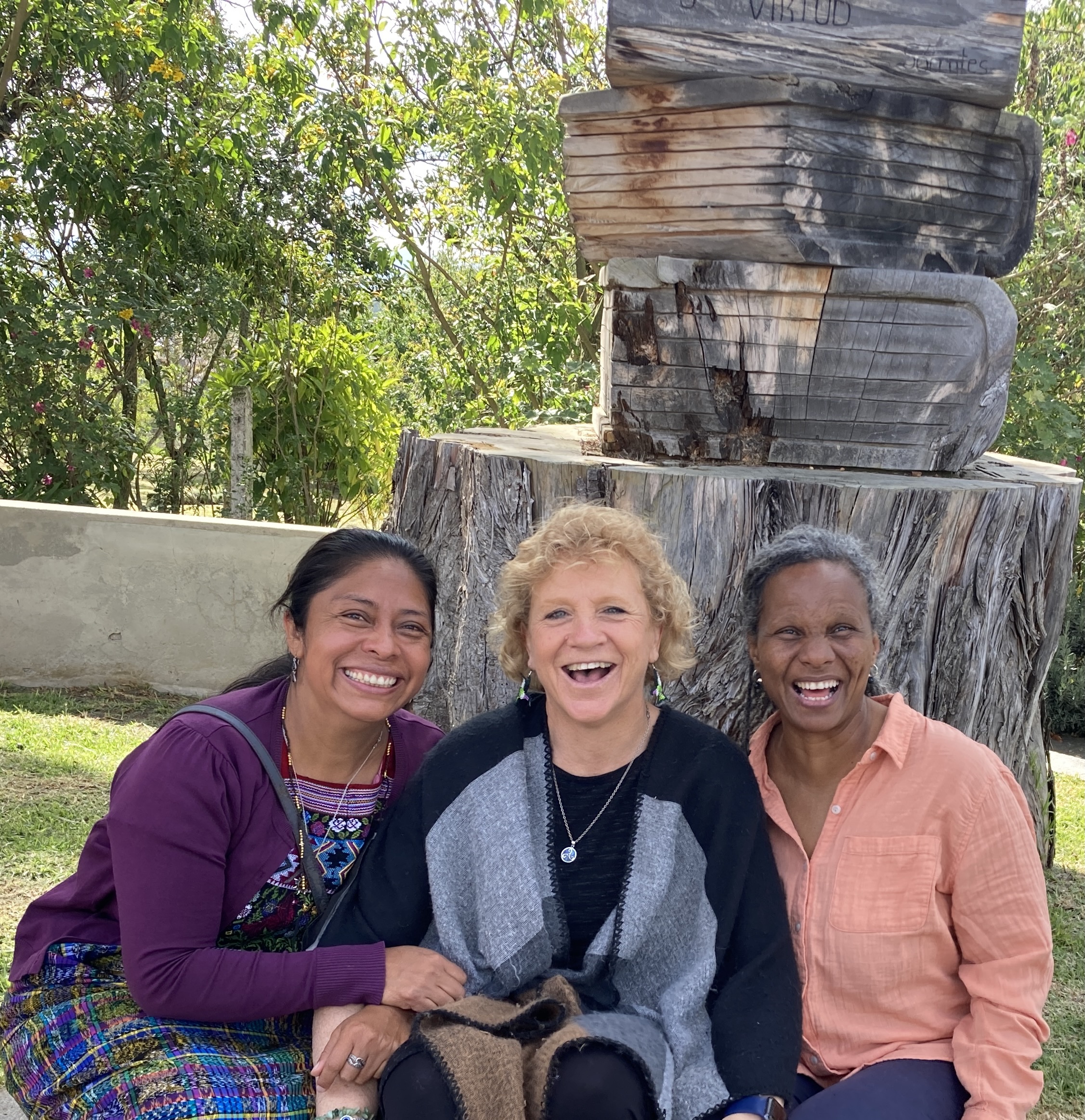
Un Encuentro de Sabidurías
A Meeting of Wisdoms
“Don’t just pretend to love others. Really love them. Hate what is wrong. Hold tightly to what is good. Love each other with genuine affection, and take delight in honoring each other.” Romans 12:9-10
“Whatever we touch, touches us.”
– Paulus Berensohn
“Christ within me and all around me, in everyone I meet.”
– St Patrick
Jung believed that humans produce in art the inner images the soul needs in order to see itself and to allow its own transformation. Kat Armas, in her book, Abuelita Faith, asks the question “What makes one wise?” She found that knowledge comes from the land, the hands of her grandmother and mother, from an embodied sense of strength, persistence and living. I’ve asked myself similar questions, “How does one become wise?” “Who in my life offers me a new way of seeing things, a solid foundation on which to build my own dreams, accompaniment as I wade through uncharted waters, travel unmarked paths, navigate unfamiliar cities?” “How do they do it? And, “How can I become a wise one as well?”
I was privileged to be invited into a circle of wisdom-keepers in Ecuador last month. This meeting of wisdoms was initiated by Eloy Alfaro, a professor of anthropology, a member of the Bautistas Por La Paz/ Baptist Peace Fellowship, a friend of my IM colleague, Ricardo Mayol, and the great grandson of the 15th Ecuadorian president, José Eloy Alfaro Delgado. He organized the first Encuentro Internacional to be held in Cuenca, Ecuador. It was to be a sharing and exchange of expertise and experience, to form a community of collaborators to support ancestral communities impacted by extraction, division, and social fragmentation. Present were local Indigenous leaders, members of RECONPAZ, Red Continental Cristiana por la Paz/Continental Christian Network for Peace with representatives from Guatemala, Mexico, Honduras, El Salvador, Dominican Republic, Puerto Rico and Ecuador, and psychologists, anthropologists, social workers, an art therapist, students and university professors/administrators from Ecuador. I was invited to accompany the process by bringing a restorative focused expressive arts and healing perspective.
The opening ceremony of the week was led by local mujeres sabias (wise women).
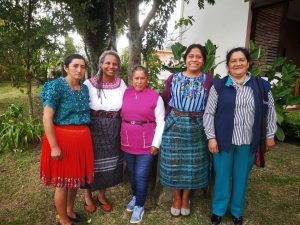
Arranging the different elements that were offered by the participants of the exchange, the four women, two from Cuenca and two from Guatemala formed what they called a caracol on the ground. This snail-like spiral, a fractal of sorts, served as a form of visible witness and wisdom. They shared their stories, guided us in ceremony and ritual, and reminded us to ask for permission and forgiveness from the Earth and each other. The Wisdom they shared was in the round, from the ground, in our surroundings. Wisdom that tends, attends, and makes amends. Wisdom that honors the ancestors by caring acts of welcome, hospitality, and gift-giving to the descendents. Wisdom that carries on the ancient teachings and stories: stories of standing in spite of oppression, repression and exclusion, stories of hope and life in, and in spite of the struggle.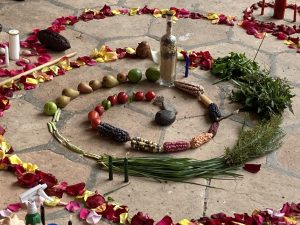
Before heading up into the community that had been ripped apart by over twenty years of extractive mining practices from foreign companies, these women set a table of wisdom full of elements to nurture and prepare our souls. The symbolic, colorful elements placed so lovingly before us, served to reconnect us to our purpose and to each other. We were told that the caracol reminds, remembers, re-centers source, expresses movement, connection, and the natural elements of sun, wind, fire, earth. We were invited to inhale and exhale beauty, breath, nurture, abundance, sensation, and safety. The artfully expressive act was sacred, earthy, and generative. It held the ancient wisdoms found in life, acceptance of death, responsibility, accountability, generosity, hospitality and healing. It was an unforgettable invitation and an honor to witness.
While in Ecuador, I was moved by the artful expressions everywhere. For a taste of what I saw and heard follow this link: https://www.icloud.com/iclouddrive/0e7gpvdvby5_C2LPLpyr1iTVw#Ecuadorean_Art_and_Image
Poetry enriches social movements like these and sustains our spirits in the long journey towards justice. Since April is National Poetry Month, what better way to end this reflection than to share a few poetic responses, one from poet Beth Richardson and one of my own.
Praise the Lord!
Praise God in the sanctuary of creation;
Praise God in the evening sky!
Praise God for God’s compassion for the earth;
Praise God for the creativity of all creation.
Praise God with a chorus of tree frogs;
Praise God with wren and mourning dove!
Praise God with the rustle of leaves and swaying of branches;
Praise God with wind and rain!
Praise God with crashing thunder;
Praise God with loud crashing thunder!
Let everything that breathes praise the Lord!
Praise the Lord!
Adapted from Psalm 150- by Beth Richardson
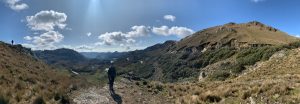
Written after entering the sacred mountain of the community of Rio Blanco through the mine.
The words first came to me in Spanish which I later translated into English:
Lágrimas silenciosas caen sobre tus mejillas terrenales
Gota por gota, descendiendo
El ritmo suave y conmovedor,
Las cuerdas del alma rasgueadas
Con permiso y perdón entramos tu herida
Oscura, fría y mojada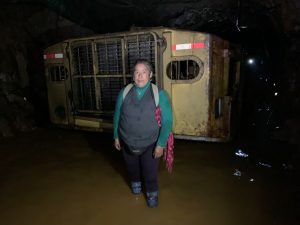
Destellos de oro y plata parpadean
Nuestras lámparas capturan sus guiños
Tu dolor y belleza nos cautivan
En tus entrañas vemos los restos del gran taladro
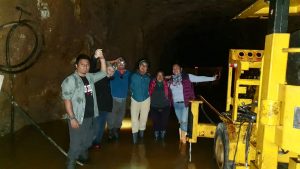 La máquina poderosa y penetrante
La máquina poderosa y penetrante
Vendido con la promesa de riqueza y vida
ahora parada dentro de la cicatriz de tu vientre
Paso a paso
Tomados de la mano, caemos adelante
Buscando aliento donde no hay
¿Estamos honrandote o violándote otra vez?
Salgo con manos manchadas
evidencia de los dos 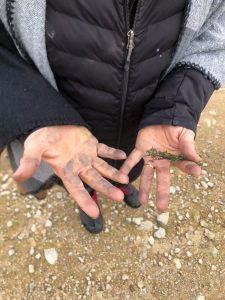
O Madre Tierra
Aunque te dañemos,
sigues dándonos comida, medicina, y vida
Aunque te matemos,
sigues dándonos la luz
Aunque te abandonemos
Sigues cuidando y sosteniendonos
Recuérdanos que el agua vale más que el oro
En el agua, nacimos
Sin el agua, moriremos
Que el ritmo de tus lágrimas nos mueva hacia el cambio
Por Mylinda Baits
22/03/2022
Silent tears fall over your earthy cheeks
Drop by drop descends
A soft and moving rhythm
Strums the soul’s cords
With permission and forgiveness we enter your wound
Dark, cold and wet
Glimpses of gold and silver shimmer
Our headlamps capture their winks
We are captivated by your pain and beauty
In your innards we see the remains of the huge drill
The machine, strong and penetrating
Sold with a promise of riches and life
Now stopped and stuck in your scarred womb

Step by step
Holding hands, we fall forward
Looking for breath where there is none
Are we honoring or violating you again?
I leave with stained hands
Evidence of both and
Oh Mother Earth
Although we harm you
You keep giving us food, medicine and life
Although we are killing you
You keep giving us birth
Although we abandon you
You care and sustain us
Remind us that water is worth more than gold
In water we are born
Without water we will die
May the rhythm of your tears move us to change.
Mylinda Baits 03/22/2022
This week, I heard from Eloy in Ecuador that as a result of our initial visit, the conflicted community members in Rio Blanco have agreed to work together with a team made up of engineers, architects, anthropologists, psychologists, a social worker, and an environmental engineer from the Catholic University in Cuenca. This is a first step towards community-based reconstruction and repair of the frays in the spiritual, emotional, physical and social fabric brought on by mining and mineral extraction. Thank you for your friendship, your wisdom and your support over these many years that allow me to be a part of these transformational experiences. I pray that you, too, have been moved to remember, honor and hold the brutality and the beauty of our ever expanding world and those who hold and share its wisdom.
Gratefully yours,
Mylinda